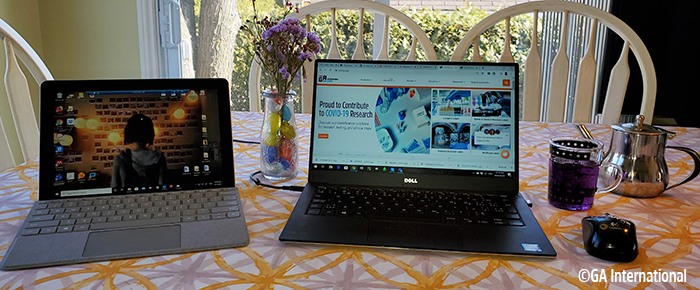 With the current spread of SARS-CoV-2, many people find themselves working from home for the first time. In fact, this article is currently being written from home. As many more academics and industry leaders are being required to work from home, we’ve compiled some tips to help keep you focused and productive.
With the current spread of SARS-CoV-2, many people find themselves working from home for the first time. In fact, this article is currently being written from home. As many more academics and industry leaders are being required to work from home, we’ve compiled some tips to help keep you focused and productive.
1 – Optimize your work from home setup
Before optimizing your hardware, cordon off an area of your home exclusively for work (this is absolutely necessary when you have small kids, as they have been known to accidentally spill milk onto keyboards). If a spare bedroom or basement is not an option, try dividing an existing space in two, like putting your desk behind the sofa. If possible, try to set up near a window, as having a nice view and some sunlight can make you feel less isolated. Next, find the most comfortable office chair you can that provides good back support and maintains your eyes at screen level when your back is straight; also make sure your wrists and neck are properly supported. With that done, start plugging everything in as needed and devising the most technologically efficient setup you can afford. A simple way to implement this is by just bringing your entire computer from work back home, if possible.
Another option is to set up a VPN with the help of IT, which will allow you to connect to your work computer from home, giving you access to all your files remotely. You can also potentially add elements that you didn’t previously have at work, like a second or third screen, if available. And don’t forget to set up a webcam and/or a mic! Though you’re at home, meetings are still likely to occur, so you’ll want to be prepared with the right equipment.
2 – Decorate your home office
Desperate times call for desperate measures. That’s why it’s imperative that any work from home setup includes things that will make you happy and keep you focused. Potted plants are a must; they oxygenate your workspace and help keep you calm. For those in science who are working from home, stress balls and other paraphernalia from the conferences you’ve previously attended are always fun to have around. If you have a pet that’s caged, like a bird or a hamster, keep them next to you; they make great working companions, and they help make you feel a little less silly when you’re talking to yourself out loud. You can also stick any molecular pathway posters you have at home to the wall, which will help give your workstation a very lab-like atmosphere.
3 – Prepare a daily schedule
For those uninitiated to working from home, waking up during the week without a work destination can feel a lot like the weekend. Even though you don’t necessarily need to, it’s worth getting dressed in casual work clothes (resist the urge to work in pjs). Preparing your breakfast, and writing down a detailed schedule for the day is also helpful. Try and stick to your normal schedule wherever possible. This keeps the atmosphere professional and helps you focus if a distraction appears. It also sets goals for each day, which is always important regardless of where you’re working.
4 – Take breaks
If you used to work in a wet lab, staying on your feet all day, this aspect of working from home may be the most challenging of all. It’s crucial to take a break from sitting though, especially when working at home. Sitting for long periods can take its toll on the body, so take a break or two throughout the day to get your legs moving. If possible, go for a walk around the block to clear your head or just get up and make yourself a tall cup of coffee or tea. You could even make protocols for preparing lunch! It should also go without saying but stay hydrated and keep a water bottle by your desk to minimize trips to the kitchen.
When taking a break, also try to socialize a bit, if possible. Right now, the majority of people around the world are stuck at home, so reach out and connect with your coworkers, friends, or family online or on the phone during these breaks. A bit of social interaction, even a small bit, can make you feel connected in a time where the world is socially distancing itself.
5 – Take sick days if needed
There’s no point in trying to work when you’re sick, especially in the current climate. If you’ve got a fever and don’t feel well, you need to get better, and the only way to do that is to rest. The work you think you might get done in the meantime is nothing compared with your long-term health.
6 – Overcommunicate
The logistics of working from home might take some time to adjust to, especially when communicating with other colleagues. Emails aren’t always opened immediately, so if there are important messages to be delivered or if something needs to be explained in detail, pick up the phone and call. If something needs to be illustrated, prepare a webcam presentation that can explain exactly what needs to be accomplished. Using on-line organizational tools, such as Asana, can also prove beneficial. The more communication that occurs between two parties working in tandem, the fewer the mistakes. It might also be a good idea to prepare a daily or weekly report of your work to send to your supervisor. This ensures they know what you’re working on and helps you stay organized and focused.
7 – Limit connectivity to social media
Stay connected to keep yourself up to date and inform yourself with credible sources, but limit the time searching the news. It’s incredibly easy to go down a social media rabbit-hole, reading story after story for an hour. Even if your job is to manage social media accounts, the amount of uncertainty regarding the world’s health and economy can become a burden that’s hard to escape from. Instead, keep yourself informed of all-important news developments, then look back to your schedule (and your workstation decorations!) to keep you on track.
8 – Make a playlist
Have a little fun at home by making a playlist of your favorite songs and podcasts. Keep in mind, not everyone is as productive while listening to music, but having something on in the background can often help focus and limit other distractions around the house.
9 – Relax once you’re done
For many in science, a lot of energy is expended in the lab and the commute to work. Without either of those two, it’s easy to feel like you’re not doing enough at home. However, your brain still needs a bit of time to unwind after a long day, so when you’re finished, take the time to relax. Indulge in anything that’s not work-related, from working out, watching television, and playing video games to making pillow forts with the kids or just quietly reading a book.
LabTAG by GA International is a leading manufacturer of high-performance specialty labels and a supplier of identification solutions used in research and medical labs as well as healthcare institutions.




